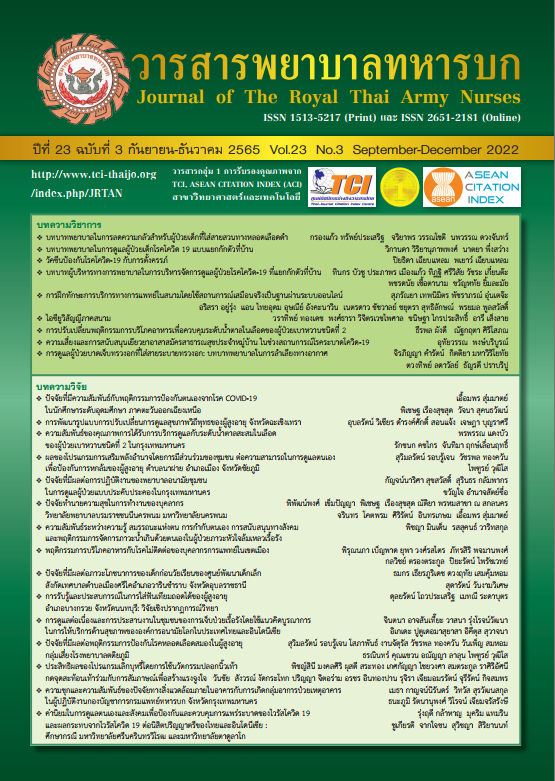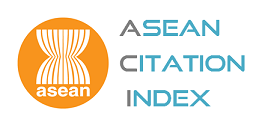ความสัมพันธ์ระหว่างความรู้ และจำนวนชนิดยากับปัญหาการใช้ยาของผู้ป่วยสูงอายุโรคเรื้อรังที่มารับบริการในคลินิกอายุรกรรม
คำสำคัญ:
การใช้ยา, ผู้สูงอายุ, โรคเรื้อรังบทคัดย่อ
การวิจัยนี้มีวัตถุประสงค์เพื่อศึกษาความสัมพันธ์ระหว่างความรู้ และจำนวนชนิดยากับปัญหาการใช้ยาของผู้ป่วยสูงอายุ โรคเรื้อรังที่มารับบริการในคลินิกอายุรกรรม กลุ่มตัวอย่าง คือ ผู้ป่วยสูงอายุโรคเรื้อรังที่มารับบริการในคลินิกอายุรกรรม จำนวน 88 คน เครื่องมือที่ใช้ในการวิจัย ได้แก่ แบบสอบถามความรู้เกี่ยวกับการใช้ยาของผู้ป่วยสูงอายุ และแบบสอบถามปัญหาการใช้ยา ของผู้ป่วยสูงอายุ มีค่าดัชนีความตรงตามเนื้อหา 0.92 และ 0.92 ตามลำดับ หาค่าความเที่ยงใช้สูตรของคูเดอร์ริชาร์ดสัน (KR-20) และสัมประสิทธิ์แอลฟ่าของครอนบาค ได้ 0.79 และ 0.80 ตามลำดับ วิเคราะห์ข้อมูลทั่วไปโดยใช้สถิติเชิงพรรณา หาค่าความถี่ ร้อยละ ค่าเฉลี่ย และส่วนเบี่ยงเบนมาตรฐาน จากนั้นหาค่าความสัมพันธ์ด้วยสถิติสัมประสิทธิ์สหสัมพันธ์ของเพียร์สัน และสถิติ สัมประสิทธิ์สหสัมพันธ์ของสเปียร์แมน
ผลการศึกษาพบว่า กลุ่มตัวอย่างส่วนใหญ่ มีคะแนนความรู้ในระดับดี (M = 10.73, SD = 1.53) คะแนนปัญหาการใช้ ยาอยู่ในระดับน้อย (M = 1.36, SD = .65) ความรู้มีความสัมพันธ์ทางลบกับปัญหาการใช้ยาอย่างมีนัยสำคัญทางสถิติ (r = .194, P<.05) และจำนวนชนิดยาที่ใช้มีความสัมพันธ์ทางบวกกับปัญหาการใช้ยาอย่างมีนัยสำคัญทางสถิติ (r = .185, P<.05) จากผลการศึกษา พยาบาลสามารถนำไปใช้ดูแลผู้สูงอายุโรคเรื้อรังที่ได้รับยาหลายชนิด ในการให้ความรู้ เพื่อให้มีการ ใช้ยาอย่างปลอดภัยต่อไป
Downloads
เอกสารอ้างอิง
Thai Gerontology Research and Development institute (TGRI). Situation of the Thai elderly 2020. Nakhon Pathom; Institute for Population and Social Research , Mahidol University. 2021. (in Thai)
Office of the National Economic and Social Development Council. The eleventh national economic and social development plan 2012-2016. Bangkok; Prime Minister’s Office. 2012. (in Thai)
Leetaweesuk J, Makee P, Charachan P, Yana P, Jindawattanawong P, Thiratanyaboon L, et al. Drug use behaviors of elderly patients with chronic disease in Chiang-Tong community Rahang sub-district, Muang-Tak district, Tak province [Dissertation]. Tak: King Taksinmaharaj Memorial Hospital Medical Education Center; 2016. (in Thai)
Mira JJ. Medication errors in the older people population. Expert review of clinical pharmacology. 2019;12(6):491-494.
Ruangritchankul S. Polypharmacy in the Elderly. Rama Med J. 2018; 41(1):95-104. (in Thai)
Chayowan N. The results of the research project on socio-economic and demographic effects of the elderly in Thailand. Institute of Demography Chulalongkorn University; 1988. (in Thai)
Tipkanajanaraykha K, Saleekul S. Role of Nurses in prevention and management of inappropriate medication use in older adults. Journal of The Royal Thai Army Nurses. 2019;20(1):31-39. (in Thai)
Kongkaew C. Drug Use in Thai elderly in lower northern region of Thailand. Bangkok: National Research Council of Thailand; 2014. Sponsored by Health Systems Research Institute. (in Thai)
National Drug Development National List of Essential Medicines Committee.Thai NationalFormulary Central nervous system. volume 1. Bangkok: Agricultural cooperative printingdemonstrations of Thai; 2010. (in Thai)
Intana J, Pannarong K, Tawetanawanich Y, Yatniyom P, Sirisabjanan L. Ensuring Medication Safety for Older People: A Protocol for Nursing Action. Journal of Prachomklao College of Nursing, Phetchaburi Province. 2021; 4(1) : 17-32. (in Thai)
Polit DF, Beck CT. Nursing research: Generating and assessing evidence for nursing practice. 8th ed. Baltimore: Lippincott Williams & Wilkins; 2008. p. 1-765.
Bloom BS, Hastings JT, Madaus GF. Handbook on formative and summative evaluation of student learning. New York: McGraw-Hill; 1971.
Best JW. Research in education. 3rd ed. New Jersey: Prentice Hall; 1977.
Thato R. Nursing research: Concepts to application. 3rd ed. Bangkok: Chulalongkorn University Printing House; 2018. (in Thai)
Ruangritchankul S. Polypharmacy in the Elderly. Ramathibodi Medical Journal. 2018;41(1): 95–104.
Bennis Nechba R, El M’barki Kadiri M, BennaniZiatni M, Zeggwagh AA, Mesfioui A. Difficulty in managing polypharmacy in the elderly: Case report and review of the literature. Journal of Clinical Gerontology and Geriatrics. 2015;6(1):30-3.
Gama RS, Passos LCS, Amorim WW, Souza RM, Queiroga HM, Macedo JC, et al. Older people’s knowledge of the purpose of drugs prescribed at primary care appointments. Revista da Associação Médica Brasileira. 2021; 67:1586-94.
Sears K, Woo KY, Almost J, Wilson R, Frymire E, Whitehead M, et al. Medication knowledge among older adults admitted to home care in Ontario during 2012-2013. Journal for healthcare quality: official publication of the National Association for Healthcare Quality. 2018; 40(3): e33-e45.
Bosch-Lenders D, Maessen DW, Stoffers HE, Knottnerus JA, Winkens B, van den Akker M. Factors associated with appropriate knowledge of the indications for prescribed drugs among community-dwelling older patients with polypharmacy. Age and ageing. 2016; 45(3): 402-8.
Panyathorn K, Beengmum N. Medication Use Behaviors in the elderly patient with Chronic disease at Chomsri village, Udonthani Province. Udonthani Hospital Medical Journal. 2019; 27(2) : 119-127. (in Thai)
ดาวน์โหลด
เผยแพร่แล้ว
รูปแบบการอ้างอิง
ฉบับ
ประเภทบทความ
สัญญาอนุญาต
ลิขสิทธิ์ (c) 2023 วารสารพยาบาลทหารบก

อนุญาตภายใต้เงื่อนไข Creative Commons Attribution-NonCommercial-NoDerivatives 4.0 International License.
บทความหรือข้อคิดเห็นใดใดที่ปรากฏในวารสารพยาบาลทหารบกเป็นวรรณกรรมของผู้เขียน ซึ่งบรรณาธิการหรือสมาคมพยาบาลทหารบก ไม่จำเป็นต้องเห็นด้วย
บทความที่ได้รับการตีพิมพ์เป็นลิขสิทธิ์ของวารสารพยาบาลทหารบก
The ideas and opinions expressed in the Journal of The Royal Thai Army Nurses are those of the authors and not necessarily those
of the editor or Royal Thai Army Nurses Association.







